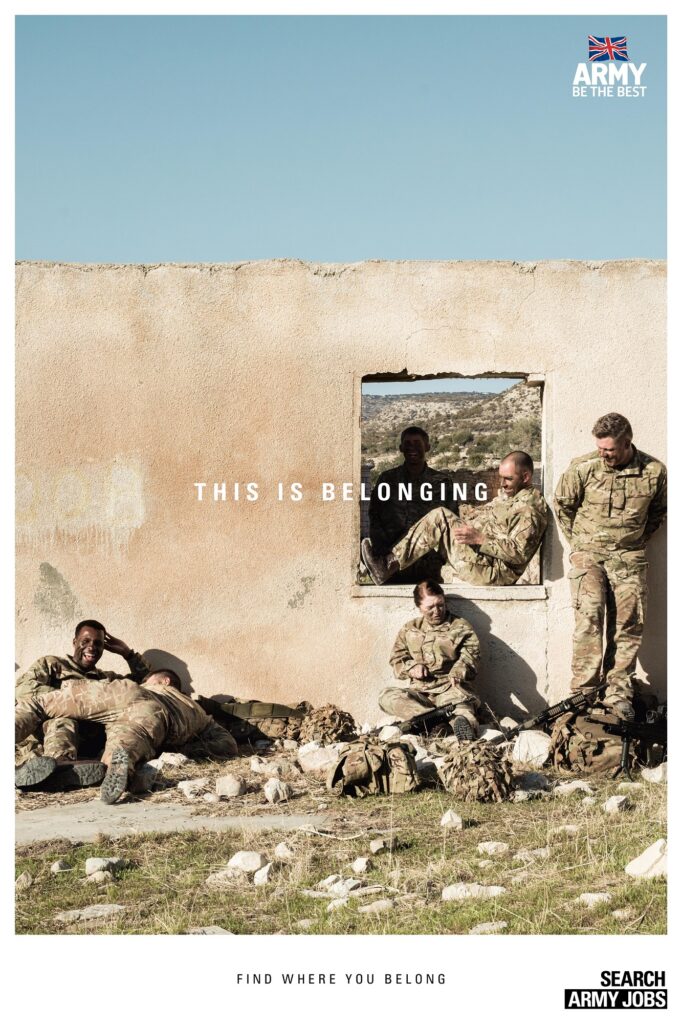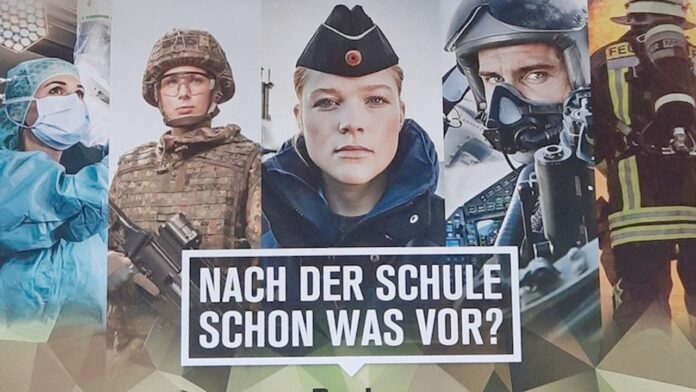Ursula von der Leyen’s Rearm Europe has allocated €800 billion to the defence of Europe, mostly earmarked for the production and purchase of advanced weapons systems. But once Europe is armed, someone should be ready to wield weapons and be trained to use them.
Young people are the main candidates for this task or, if you will, the predetermined victims. That’s why the Common security and defence policy approved on April 2 by the European Parliament calls “for the EU and its Member States to develop awareness-raising and educational programmes, especially for the young, aimed at improving knowledge and facilitating debates on security, defence and the importance of the armed forces and at strengthening the resilience and preparedness of societies to face security challenges”. It means the militarization of education – schools and universities – within the framework of a broader militarization of society, including workplaces.
Would you die for your country?
According to a poll released by Gallup International in 2024 to the question “If there were a war that involved (YOUR COUNTRY), would you be willing to fight for your country?”, only 14 percent of Italian people stated that they are ready to fight and die for their homeland. It is the lowest percentage in Europe. Mandatory military service in Italy has been abolished in 2005, but since the winds of war blow again on Europe the discussion on reinstating it is unfolding. Ignazio La Russa, Chairman of the Senate and founder of Fratelli d’Italia (together with Giorgia Meloni) and the current Minister of Defence Guido Crosetto (who was the head of Aerospace and Defence Employers Association before being appointed), proposed a “mini naja”, a six-month military training course on a totally voluntary and unpaid basis, which can be used in the progression of studies through the recognition of certificates and university credits.
The attempt to use the public education system to indoctrinate and prepare young Italians for war has been underway since long. For ten years, the Ministries of Education and Universities have been making agreements with the Ministries of Defence and Labour, the Carabinieri and the Navy to develop joint activities, including school-to-work projects, such as the one of the Giovanni Falcone high school of Gallarate, near Milan, at the NATO base in Solbiate Olona, where the military handed out to students caps with the inscription We are NATO at the end of the courses.
Even primary schools
Militarism does not spare even primary school pupils. In January 2024, the Pinerolo Logistic Regiment celebrated the 227th anniversary of the Italian flag in the southern town of Gioia del Colle, near Bari. “At the ceremony, which took place in the presence of the city authorities,” reported Elisabetta Piccolotti, a left MP, in a parliamentary question, “primary and secondary schools were also invited, and the children and young people present were given a test of military fitness. In order to pass it, they also did push-ups with an instructor, climbed on military vehicles pressing buttons, moved dummies and wore bulletproof vests – and ten received a certificate”.
An increasing number of schools invite police and military officers in the classrooms to speak on road safety, bullying, cyber security, ect. But often these are trick courses: officers are called in to talk about a topic, but they often go off the rails. “Instead of focusing on the official topic, they tell us that occupying the school is a ‘socially dangerous’ behaviour and that you run legal risks”, told me a group of students in Rome few months ago. “They do this especially with those in the first classes, who obviously feel intimidated.” A case or a strategy? “Once, the school took us to the Foro Italico. Officially it was for Sports Day, but when we got there it was full of police and military stands, police cars and drug-sniffing dogs.”
The other side of militarization of the schools is the implementation of harsher discipline in the classrooms. Meloni’s Minister of Public Education, Giuseppe Valditara, for instance, promoted a reform of the school disciplinary code targeting students occupying their schools or merely “violating the rules”.
The Observatory against the Militarization of Schools and Universities, created by grassroots unions together with Pax Christi (a group of peace activists with a catholic background) after the invasion of Ukraine in 2022, has brought together hundreds of teachers and activists. It has been denouncing the intervention of the military in classrooms on a daily basis and promoting debates across Italy and has become an important point of reference for those fighting against militarist propaganda among the youth.
In workplaces
Today’s students are tomorrow’s workforce and workplaces are not spared by the wave of militarization affecting Italy. Federsicurezza, the association of private security companies, for instance, has an agreement with the Ministry of Defence to “capitalise on the skills acquired by military personnel during their deployment on national and international missions” by hiring them. Confidustria, the biggest association of employers, has done the same with the Abruzzo Military Region, because, as explains the president, “These are people who have special aptitudes, such as discipline and teamwork”. The same practice was applied by Confapi, the confederation of small and medium-sized industry, in the Marche region and by the transport company of the northern Province of Bolzano.
“Military spirit”
Anyway, this is not just an Italian issue. The ruling classes have been using school to instill the “military spirit” in the new generations since the 19th century. The teaching of physical education in Europe was first introduced in French schools after the defeat of Sedan, in the course of the Franco-Prussian War, which was attributed to the poor physical preparation of French soldiers. After the end of the Cold War, this use of school has faded, but the returning winds of war bring it back into vogue.
In the UK, the military and the arms industry enter schools to promote enlistment, military culture or “science”. In London, particularly in the poorer boroughs, 40 per cent of schools were visited by the military between 2008 and 2009; in Scotland between 2016 and 2017, it was close to 70 per cent. BAE Systems, which has sold over £20 billion worth of weapons to the Saudi armed forces for the war in Yemen, writes on its website: “We visit over 100 schools each year to explain who we are and why science subjects are so important.”
On May 15, presenting the policies of the new German government to the Bundestag, Christian Democrat Chancellor Friedrich Merz said that the German Bundeswehr (BW) would become the “strongest army in Europe” and experts say that military forces should increase their ranks to 460.000 people. In Germany mandatory military service was abolished in 2011. The armed forces have reacted with massive campaigns to promote voluntary enlistment, including on social media, such as those that can be seen on the Tik Tok account Bundeswehr Karriere account or by opening up to the LGBT movement, with participation in Pride parades and the creation of an Working Group of Homosexual Members of the German Armed Forces (Arbeitskreis Homosexueller Angehöriger der Bundeswehr- AHsAB), which since 2020 has been called Queer BW.
In half of the German states, there are partnerships between schools and the armed forces; the military visit schools; they intervene in the curriculum and in teacher training. Germany has been officially reprimanded by the UN for Bundeswehr initiatives “specifically aimed at children”. Despite this, in the last five years the Bundeswehr has recruited almost 8,000 underage boys and girls – almost 20,000 17-year-olds since 2011 – and trained them to use weapons. In 2023 there were almost 2,000, a record number, citizens who, as a TAZ journalist wrote, “cannot vote for Bundestag candidates but can learn to die”. Nevertheless, according to the above mentiond Gallup polls, only 24 percent of Germans would die for their homeland and a number of young recruits retire before completing their military training.
For an anti-militaristic battle
In Italy, as well as in Germany and the rest of Europe, militarism is advancing, but it has to deal with a situation we cannot compare to that of 100 years ago. Indeed European societies have profoundly changed. There are no longer masses of millions of poor, illiterate peasants ready to be used as cannon fodder. The new generations are no longer used to the idea of losing their lives for their country and, above all, why should they do so? For a temporary and underpaid job? For a future of misery when they are retired? This new situation represents a huge opportunity for an anti-militarist battle. The challenge is: how should the revolutionaries turn this opportunity into a political platform and concrete actions?




